#Hermaphroditus deity
Text
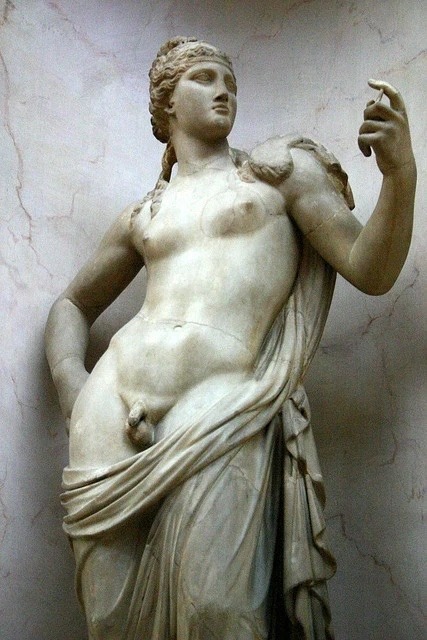
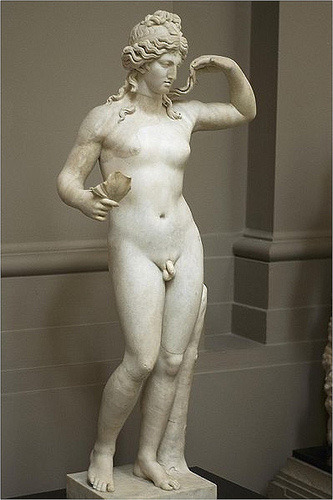
Oh, Hermaphroditus, a Holy One.
1. Hermaphroditus statue from Imperial Rome, around 70-100 AD, at "Lady Lever Art Gallery" in Europe England
2. Hermaphroditus statue from Imperial Rome in the 2nd century AD, at "Louvre" in Paris, Europe France
#greek mythology#greek gods#hellenic polytheism#hellenism#greek pantheon#hellenic#greek myth#hellenic gods#theoi#helpol#hellenic polytheistic#hellenic deities#hellenic pagan#hellenic worship#greek deities#ancient greek mythology#ancient greek#ancient greece#theoi worship#deity work#hermaphroditus#Hermaphroditus deity#queer#queer community#queer pride#statue#greek myth art#art#intersex
369 notes
·
View notes
Text
Greek Gods 101: Hermaphroditus
Hermaphroditus is a god of effeminates and hermaphrodites. Excluding the universal offerings, some common offerings include:
Roses
Fertility Symbols
Shells
Makeup
Depictions of Fish
Depictions of Hermaphroditic Animals
Mirrors
Jewelry and Other Adornments
Symbols of Queerness (i.e. flags)
For devotional acts, some activities that can be done for them include:
Exploring Your Gender Identity
Challenging Gender Norms
Learning About Queerness & Queer History
Wedding or Promise Rings
Practicing Self-Care
Learning About Different Types of Intersexuality
Supporting Queer and Intersex People
They are not celebrated in any Athenian holidays.
#hermaphroditus#hermaphroditus deity#hermaphroditus god#deities#hellenism#helpol#hellenic#hellenic pagan#hellenic polytheism#hellenic polytheist#hellenic community#hellenic deities
143 notes
·
View notes
Photo

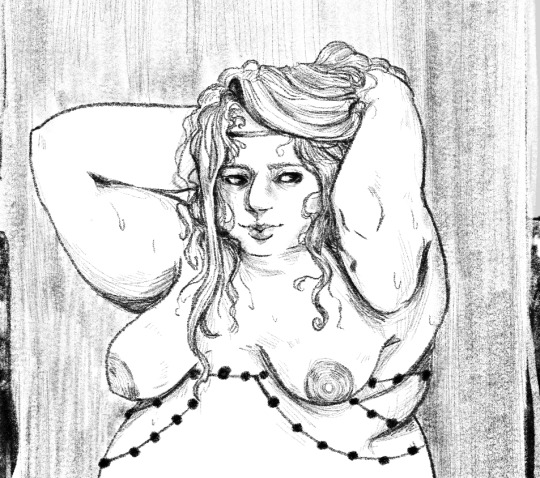
THE EROTES, winged gods of love.
— HERMAPRODITUS, god of androgyny.
#hermaphroditus#hermaphroditos#aphroditus#greek god#greek goddess#greek mythology#greek myth art#deity devotion#the erotes#greek myths#its artistic nudity#i've asked hermaphroditus for help in getting t and dealing w folks#considering i live in a super anti trans state#and they've brought me comfort and help#i quite enjoy their presence
221 notes
·
View notes
Text
I give so much praise to Hermaphroditus for my wonderful, androgynous, intersex body.
33 notes
·
View notes
Text
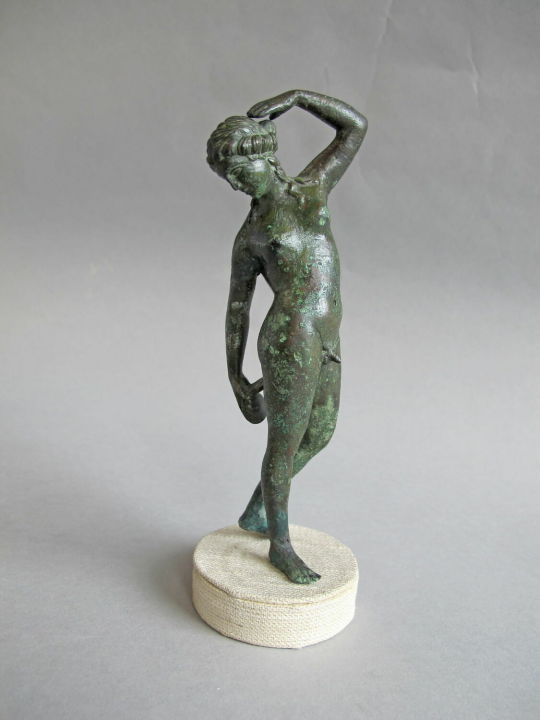

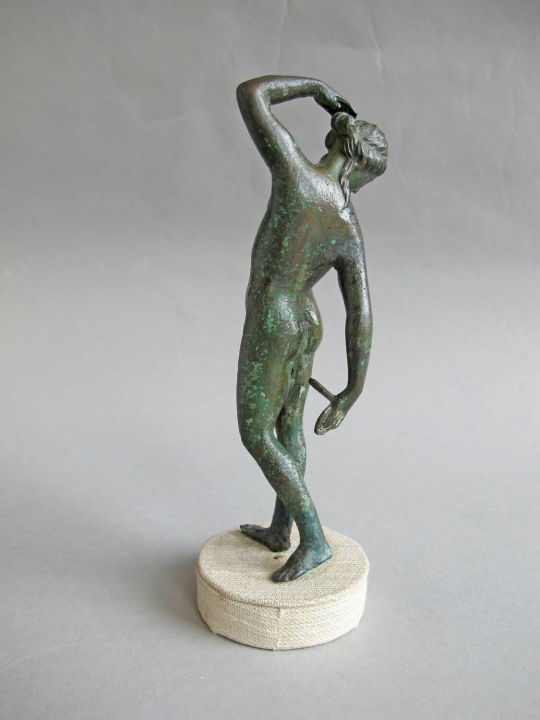
Hellenistic Egyptian bronze statuette (19 cm) from the Louvre, depicting a figure we might describe as intersex or transfeminine, posed looking back over her shoulder at her behind in a hand mirror.
I might editorialize to describe this as Hermaphroditos Kallipygos, though the Louvre listing contains no details as to who might be depicted.
#art#deities#hermaphroditus#intersex#trans#yay bodies#aphrodite#vanity#would welcome image descriptions if anyone is so inclined
100 notes
·
View notes
Text
Do y'all ever get this warm feeling in your chest when looking at items related to/of certain deities? I was looking up some statues of hermaphroditus on Etsy and man I am feeling something or another, like unspoken kindness?? Not to be all poetic or cryptic it just feels like acceptance. Maybe I just find them pretty but this is the most relaxed and or comforted I've felt in relation towards thinking about a deity.
#hermaphroditus#deity work#witchblr#witchcraft#witchcraft community#magick#witches of tumblr#greek witchcraft#and YES i already know its a sign that i should work with them i just never felt this overcome with emotion about it???
25 notes
·
View notes
Text
Sooooo, does anyone work with Hermaphroditus or Atlantius? I've been drawn to Hermaphroditus, but as with Pluto when I was drawn to Hades and not Pluto, it might be Atlantius instead. I'm currently working with Pluto, Loki and Beelzebub, and Beelzebub told me that another deity was going to reach out within the next year when I first met them. I've just used tape to bind for the first time so this is a big turning point for me in terms of my gender identity, but I'm also just having a lot of general changes in my life and it's times like this when a deity seems to pop up. Can someone please help me? I can't find anything about either Hermaphroditus or Atlantius online aside from that one myth that I think anyone who knows about Hermaphroditus knows. Please help meeeeeeeee
#paganism#witchcraft#pagan#witchblr#lgbtq#pagan witch#witch#trans#hermaphroditus#atlantius#greek mythology#greek gods#roman deity#romanic pagan#roman pagan#roman paganism#hellenic deities#hellenic pantheon#hellenic pagan#hellenic paganism#please help#send help#deity witchcraft#deity work
9 notes
·
View notes
Text
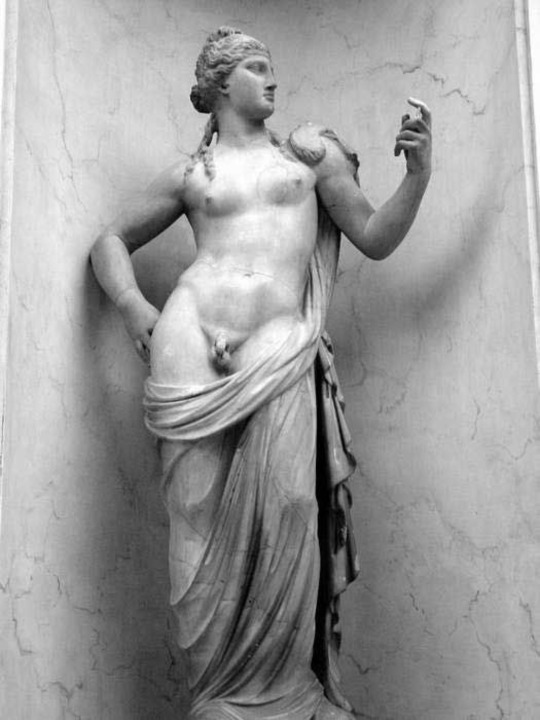
Hermaphroditus, SHE resembles more a transsexual deity than an intersex creature.
11 notes
·
View notes
Text
Hermes Deity Deep Dive
This was a requested deep dive on Hermes, you can request a deep dive on my ko-fi for $5!
Hermes is one of the 12 Olympian Gods and is known as the herald or the messenger of the gods. Often depicted wearing winged shoes and holding a staff or wand, he was known to be the patron of heralds and messengers.
As with many deities, Hermes is the god of many things, such as poets, athletics, luck, travel, trade, omens, animal husbandry, and thieves. This multi-faceted god was often conflated with the Roman Mercury, though there are some key differences.
With that, let’s get to know Hermes!
Parents and Siblings
Zeus (father)
Maia (mother)
Lovers or Partners
Theses are the more common lovers found referenced with Hermes.
Aphrodite
Brimo
Daeira
Peitho
Persephone
Penelopeia
Children
These are all of the cited children I found, there may be some discrepancies depending on which myth you read and who tells the story.
Evander
Pan*
*The primordial god Pan has many origins, being the son of Hermes and Penelopeia is just one of these origins. The next three are thought to be aspects of Pan that may also be personified separately. Pan may be a tripartite deity, this will have to wait until Pan gets his own Deep dive.
Agreus
Nomios
Phorbas
Hermaphroditus
Abderus
Autolycus
Eudoros
Angelia
Myrtilus
Palaestra
Aethalides
Arabius
Astacus
Bounos
Cephalus
Cydon
Pharis
Polybus
Prylis
Saon
Epithets
The Greek gods have massive lists of names, here are some I’ve found on multiple lists.
Atlantiades
Argeïphontes
Cyllenian
Kriophoros
Notes
One of the more popular myths of Hermes is the myth of him stealing Apollo’s cattle as a baby. Hermes was freshly born, escaped his crib and stole his half-brother’s herd of cattle. In order to avoid getting caught, Hermes plays some devious and clever tricks, though the tricks he plays depends on the myth-teller. At some point on his journey with the cattle he finds a tortoise whose shell he turns into the very first lyre. Inevitably he gets caught by Apollo but the sun god is so charmed by the lyre that he allows Hermes to keep the cattle or at least forgives him.
Not only this myth, but others depict him as a trickster who enjoys a good prank.
Hermes was known to be the patron god of Arcadia as he was born in Mount Cyllene in Arcadia according to Homer.
Philostratus places Hermes’ birthplace in Olympus, however.
Hermes is also a psychopomp, a traveler between the realms of the living and dead who aides souls headed to the underworld.
It’s possible that Hermes’ name derives from the Greek herma which meant “heap of stones” or “cairn”. These heaps of stones, or cairns, were roadside markers for travelers and may have also acted as small shrines for the deity.
Hermes was notably charming even as a baby, considered a darling of the gods (ref) where many of the deities in the pantheon would teach or entertain young Hermes.
Hermes was said to have invented wrestling and racing.
One of his more prominent cults was in Attica during the Classical period. By this time he was considered to be the god of travelers and sailors.
Thoth was another deity conflated with Hermes.
Hermes in many myths and traditions is seen to be a liminal deity. Not only is he able to travel between the underworld and overworld with ease, but he is often depicted as both young and old, as a mediator between god and man, and as a dream bringer.
It’s possible that this ties into his involvement as an initiator for young adulthood.
The Hermea were festivals held in honor of Hermes.
Hermes’ staff or wand, the caduceus (staff with two snakes wound around it), is often mistaken for the Rod of Asclepius (staff with one snake wound around it).
Modern Deity Work
Explanations are placed next to each item on the list.
Correspondences
Rocks/Stone/Crystals
Copper - I couldn’t find a source for this but I’ve seen it on multiple posts now and my friends who follow Hermes cite this as well so it is worth a mention!
Gold
Silver
Rocks - Just rocks, specifically stacked rocks from the roadside. Cairns were
Herbs/Plants
Crocus flower - based on the myth where he accidentally kills Krokos and turns him or his blood into a flower.
Strawberry Trees (botanical name Arbutus unedo) - he had been nursed under one according to some myths.
Animals
Hare - he placed the hare amongst the stars as the constellation Lepus.
Tortoise - created the lyre out of a tortoise shell.
Cattle - stole Apollo’s cattle as a baby and is known to be a god of cattle rearing.
Hawk - he transformed two men, Hierax and Daidalon, into hawks.
Symbols
Caduceus - the name of the staff or wand he is depicted as carrying.
Shepherd’s Pipes - he created the shepherd’s pipes.
Winged shoes - the type of shoe varies by myth or artistic depiction but the “winged” part remains the same.
Winged hat - he is often depicted wearing a winged hat.
Traveler’s hat - he is often depicted wearing a traveler’s hat.
Offerings
Shepherd’s Pie - This is purely based on the fact that it’s similar to shepherd’s pipes and I find it amusing, I’m sure a god who enjoys jokes would enjoy this too but that’s my bias.
Koumara - I found this post by @grecowitch explaining that while strawberries are often cited as offerings for Hermes, this misconception comes from the misleading name of the “strawberry tree” which actually produces fruit called koumara! That said, I imagine Hermes wouldn’t be upset at receiving delicious strawberries.
Animal skins - Hermes
Coins - he is known to be a patron of not only merchants but thieves!
Other standard offerings to Grecian deities are olive oil, honey, cheeses, various fruits, milk, and candles.
Acts of Devotion
Write poetry - he is a god of poetry.
Travel - he is the patron god of travelers.
Learn how to play the lyre - he created the lyre.
Play sports - he is known as a god of athletics and during his festival days people would play sports.
Play pranks - I won’t advocate for harsh pranks, personally, but he is known as a trickster so do with that what you will.
Pray to him - pretty standard devotional act.
Go to the gym or otherwise exercise - he has been cited as the patron deity of gyms.
Build a cairn - DO NOT STACK ROCKS IN NATURE as it disrupts the natural environment! However, feel free to build one on your porch or in your house with rocks you may already have.
Celebrate Hermea - I was unable to find a set date-range for these festivals. Some suggested around the beginning of August, possibly due to his conflation with the Irish god Lugh’s holiday Lughnasadh; others suggested May 15 due to the Roman god Mercury’s holiday Mercuralia. That said, he was known to be worshipped during other holidays in Greek tradition alongside other deities.
References and Further Reading
Encyclopedia Mythica
The THEOI Project
Wikipedia
Britannica
129 notes
·
View notes
Note
this may seem like a weird question, and if this comes across as disrespectful i apologize. but, could lady aphrodite be - well - a man? could they appear to a devotee of theirs as male instead of female? i know spirits' appearances are fluid and change depending on who, when, where, what, and so on, but, is it possible that they ever change their gender? i've never seen anybody mention it, and, aphrodite doesn't feel female to me, instead they feel as a gender-reversed version of themself.

DID YOU MEAN APHRODITUS ?!
Lol I love this topic. Yes! You are not confused in feeling a male or masculine energy in Aphrodite. There’s a LOT of really cool history that goes into the archetype of the God(dess) of Venus and love and war, but to make a very long story short, Aphroditus (or Aphroditos) was the male Aphrodite originating from Amathus on the island of Cyprus and celebrated in Athens. He was later then syncretized with the offspring of Aphrodite and Hermes, Hemaphroditus. Different interpretations may or may not consider them to be the exact same entity. What we do know is that both Aphroditus and Hermaphroditus are always portrayed with an androgynous, intersex, or transsexual body, a mix of female and masculine traits and anatomy.
It’s widely accepted that Aphrodite/ Aphroditus is derived from the Mesopotamian Goddess Inanna/Ishtar. Inanna is a very important deity in regards to gender and sexuality, as she was the Goddess known to transform men into women and women into men. She was the patron of transgendered, intersex, and nonbinary people, and her holy priests and priestesses were very queer! She was portrayed with a beard, breasts, basically whatever she wanted lol, as she was believed to be the origin of queerness itself. All bodies, male, female, or something in between, are capable of exercising the joy of Inanna!
In general, the energy that we receive from Venus has always seemed to be inherently queer, gender bending, and fluid, which makes sense for the planet of love- love for others as well as love for the self! It transcends our traditional understanding of gender and sex and shows us how all of these identities are beautiful and powerful.
People often associate Aphrodite very highly with females vagina power, which she totally does embody to the max of course, but she also very much represents love for the self that transcends the flesh. She has always been the biggest ally to transmascs and femmes. In some interpretations, the God(dess) may be trans and queer themselves.
As a trans man myself, I personally view Lord Lucifer as an Aphroditus, the beautiful son of an Aphrodite. The divine masculine aspect of Venus that exists within the divine feminine. Combined with his values of self love, luxury, freedom, knowledge, and the courage to be your most authentic self, I see Lucifer, Aphroditus and Aphrodite as the pillars of queer divinity.
#witchcraft#magick#occultism#pagan#demonology#paganism#witch community#witch aesthetic#witchblr#grimoire#queer community#queer#inanna#aphrodite deity#aphrodite#aphroditus#lucifer deity#luciferian witch#deity witchcraft#deity#deity work
46 notes
·
View notes
Text
Greek Gods 101: A Masterlist
This is a masterlist of the “Greek Gods 101” series. This series aims to provide basic information and worship ideas for both major and minor deities. This masterlist also involves heroes, deified mortals, spirits, and other figures of Greek mythology.
Aceso
Acheron
Acratos
Aedos
Aegle
Aeolus
Aether
Aglaea
Akhlys
Ampelus
Amphitrite
Ananke
Anemoi
Angelia
Anteros
Antheia
Aphrodite
Apollon
Aporia
Ares
Arete
Ariadne
Aristaeus
Artemis
Asklepios
Asteria
Astraeus
Astrape
Athena
Atlas
Bia
Britomartis
Calliope
Carpi
Cassandra
Ceraon
Cerberus
Ceto
Chaos
Charon
Chione
Chiron
Chloris
Chrysos
Circe
Clio
Clymene
Comus
Cratus
Cronos
Daphne
Deimus
Deipneus
Demeter
Dicaeosyne
Dike
Dionysus
Dysnomia
Ececheria
Eileithyia
Eirene
Ekho
Electryone
Eleos
Elpis
Endymion
Enyo
Eos
Epiales
Epione
Epiphron
Erato
Erebus
Eris
Eros
Ersa
Eucleia
Eudaemonia
Eunomia
Eupheme
Euphrosyne
Euporia
Eupraxia
Eurybia
Eurydice
Eusebia
Euterpe
Euthenia
Eutychia
Fates
Furies
Gaea
Ganymedes
Gelus
Hades
Harmonia
Harpocrates
Hebe
Hecate
Hedone
Hedylogus
Helius
Hemera
Hephaestus
Hera
Heracles
Hermaphroditus
Hermes
Hestia
Hesychia
Himeros
Homonoia
Horae (Seasons)
Horae (Time)
Hormes
Hybris
Hydros
Hygeia
Hymenaeus
Hypnus
Iaso
Iris
Lelantus
Lethe
Leto
Macaria
Matton
Medusa
Melinoe
Melpomene
Methe
Mnemosyne
Morpheus
Nemesis
Nike
Nyx
Oizys
Orpheus
Orthannes
Ossa
Ourania
Ouranos
Ourea
Paeon
Paidia
Palaemon
Pallas
Pan
Panacea
Pandaisia
Pandora
Pannychis
Panopia
Paregoros
Pasithea
Pegasus
Peitho
Penia
Penthus
Persephone
Perses
Perseus
Phales
Phanes
Phaunus
Pheme
Philophrosyne
Philotes
Phobus
Phoebe
Phorcys
Phthonus
Phusis
Pistis
Plutus
Poena
Polemus
Polymnia
Pompe
Pontus
Ponus
Porus
Poseidon
Pothus
Priapus
Prometheus
Pronoea
Prophesis
Psamathe
Pseudologoi
Psyche
Ptocheia
Rhea
Selene
Silenos
Sophrosyne
Soter
Soteria
Styx
Tartarus
Telesphorus
Terpsichore
Tethys
Thalassa
Thalia
Thalia
Thallo
Thanatus
Thaumas
Thea
Themis
Theseus
Thesis
Thrasus
Thyone
Tithonus
Triptolemus
Triton
Tritopatores
Tyche
Tychon
Urania
Uranus
Zelus
Zeus
What is a “Universal Offering/Devotional Act?”
Feel free to request or suggest deities! This list will be done in order but you can ask for me to complete one that’s further down the list.
This list is subject to change. There are probably repeat deities (deities who go by multiple names, parts of groups like the Horae or Charities who are mostly grouped together, etc.) on this list. Some deities are not on here. Some names are spelt wrong or different.
#masterlist#masterpost#greek gods 101#deities#hellenism#helpol#hellenic#hellenic pagan#hellenic polytheism#hellenic community#hellenic polytheist#hellenic deities
1K notes
·
View notes
Text
Still thinking about her.
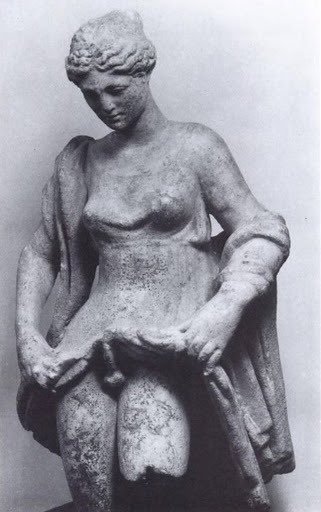
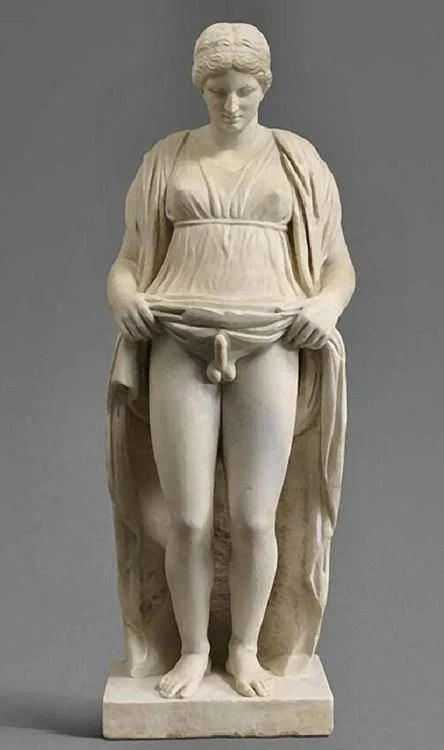
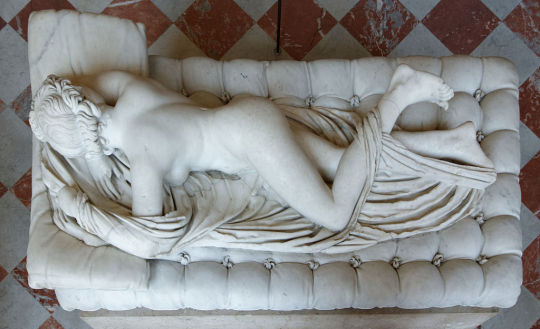
Like, ancient people carved these out of rocks, in great detail, because that's how enamored they were with the idea of a being who was beautiful and feminine, and had a penis. Maybe they were inspired by meeting an intersex person or trans girl in their lives. Maybe the art was an expression of what they wished they could become. Or maybe they were the fetish artists of their time, taking commissions so they could pay their bills. Whatever the reason, someone decided that this concept was of such importance that it needed to be carved into fucking statues.
I've only done light research, but Aphroditus seems to have originated as someone's high-concept fanon idea of "what if Aphrodite, the beautiful goddess of love, had a dick?"
And then a few hundred years later someone else expanded that concept into their OC Hermaphroditus, the child of Hermes and Aphrodite, who basically got named after his parents' portmanteau ship name. (And then the writer used that OC to tell a cautionary tale about being ensnared and cursed by the actions of evil women or whatever.) But also it became the origin myth for intersex bodies, as it was said that anyone who bathed in the pool where Hermaphroditus was transformed would then be similarly transformed themselves.
There's one tale of the female Aphrodite where Theseus sacrifices a goat to her, and the goat transforms from a she-goat to a he-goat.
Some Romans, when they adapted Aphrodite into Venus, seemed to conceptualize Venus as genderfluid, sometimes taking the form of Venus Barbata, or Bearded Venus. "The name Venus in itself, is masculine in its termination, and it was perceived that the goddess becomes the god and the god the goddess sometimes." [x]
So it's evident that people have been thinking about gender bending concepts, and feminine beauty in a body with a penis, for a very long time. Aphroditus dates back to at least 7th century BC. They even held festivals where people cross-dressed to honor Aphroditus. The festivals allowed "women to act the part of men, and men put on woman's clothing and play the woman." [x]
And that stuff makes me feel a little more connected to humanity and history. I don't know what I am, gender nonconforming, genderfluid, or maybe a trans girl, but in any of those labels, it's comforting to think that people in history were probably feeling the same feelings. Maybe some of their attempts at femininity looked a bit like mine, since they didn't have access to laser hair removal either. Maybe when some of them put on women's clothing, they felt a little scared of how much they liked it. Maybe some of them felt like they weren't really feminine enough to deserve to take on the role of a woman. Maybe some of them felt a little sad when the permission of the festival passed, like I felt when the permission of Halloween passed and I went back to wearing boy clothes. Maybe when they conceptualized this deity in ancient Greece, they were trying to dream of what I sometimes try to dream of: a heaven where gender is more flexible than it is here. Maybe some of them wanted to imagine that the gods had these genderfluid powers because they wished they could have such powers, like I wish I could have such powers.
Maybe there are some ancient Greek and Roman people in the afterlife who smile when they see me put on a skirt, remembering a festival 2500 years ago where they did that. And that idea warms my silly heart.
#queer posts#intersex#transgender#gender nonconforming#genderfluid#nonbinary#stuff about me#my genderqueer panic 2k23#comforting thoughts#social issues
53 notes
·
View notes
Text
Theoi Info Sheets Series Part 7: Hermes
"I cannot write about Hermes impersonally. He is the first god who moved me, who opened my hear to the mystery of the gods and the extraordinariness of the ordinary. He is the god of the unexpected, of luck, of coincidences, of synchronicity. 'Hermes has entered in our midst', the ancient Greeks would say when a sudden silence entered the rooom, descended on the coversation, inroduced into the gathering another dimension. Whenever things seemed fixed, rigid, 'stuck', Hermes inroduces fluditiy, motion, new beginnings - and the confusion that almost inevitably preceeds new beginnings"
- The Gods of Greece, Arianna Stassinopoulos & Roloff Beny
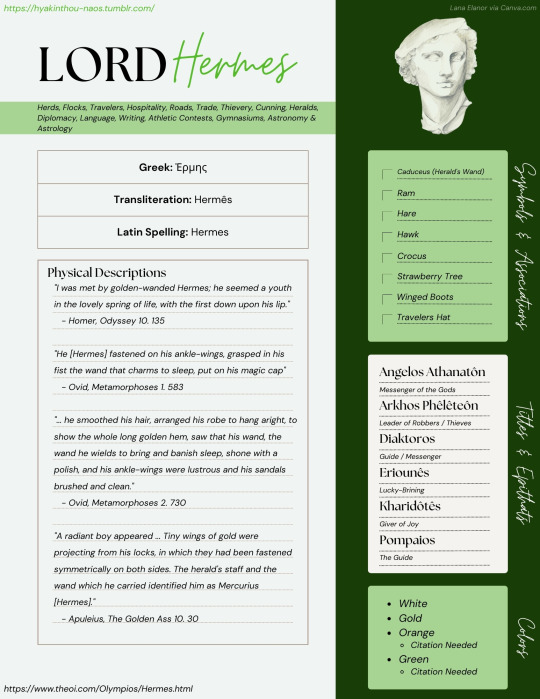
I want to take a moment to talk about the syncretisms I personally have for Lord Hermes.
I personally syncretize Lord Hermes with Lord Mercury, The Buddha, and Lord Budha (the Hindu God of the planet Mercury).
I feel as though the syncretism with Lord Mercury is fairly self explanatory so I'll move on to The Buddha.
Both Hermes and The Buddha act as messengers between the realms of Earth and the Aether; Hermes delivering messages to the Theoi and The Buddha delivering messages regarding Dharma and the path to enlightenment. Along the same line, both Hermes and The Buddha are Psychopomp figures; Hermes guides the souls of the departed to The River Stix in The Underworld and The Buddha guides souls toward spiritual liberation and enlightenment.
When comparing Lord Hermes and Lord Budha, there is one obvious parallel- they both rule over/are associated with the planet Mercury. Additionally, both entities are associated with intellect, learning, knowledge, wisdom, and wit. An often overlooked similarity between Hermes and Lord Budha is there association with transgender/non-binary figures.
For Lord Budha, his spouse is the Devi Ila. While this Goddess is sometimes referred to as female (and occasionally regarded as an aspect of Saraswati) she is also referred to as male. I interpret these “inconsistencies” by viewing Ila as a transgender deity.
For Hermes, he (with Aphrodite) fathered Hermaphroditus - an intersex deity associated with androgyny, balance, and the harmonious integration of different energies.
If anyone shares these syncretisms I'd love to hear from you! I have yet to see anyone connect Hermes to The Buddha or Lord Budha.
*You may have seen this info sheet before on thewitchfarhan.tumblr.com - that is my old Tumblr. These info sheets are my own creation - please do not repost without credit.
#Theoi Info Sheets Series#Theoi Info Sheets#The Temple of Hyacinthus#Hermes#Lord Hermes#God Hermes#Hermes Deity
9 notes
·
View notes
Text
Feeling gender, might consider starting a work relationship with hermaphroditus to aid me in my transition/for androgyny "glamours" and energy
#nonbinary witch#hermaphroditus#witchblr#witchcraft#witchcraft community#witches of tumblr#magick#greek witchcraft#hellenism#Hellenistic#deity work#trans witch#if anyones ever worked with them before feel free to leave your experience !!
18 notes
·
View notes
Photo

All Theoi are completely and utterly accepting of trans individuals. Their message is to spread love and positivity, not hatred between their worshippers. Mortals who turn Deities into sources of hate and use them as an excuse for bigotry are not true worshippers and will never receive Divine support.
There are multiple examples of trans experiences that are described in myths of Venus, Diana, and other stories of the past. While the interpretation of many of these stories is up to us due to how scarce and non-detailed the sources are, we as modern worshippers can analyze these myths as stories depicting trans individuals receiving their deserved place among the worshippers and followers of the Gods.
This post is to both tackle the horrible misuse of Venus’ and Diana’s names as well as spread positivity about transgender individuals inside of their respective worship circles.


Venus is a Goddess who spreads love, be it love for another or love for your own self, and of course that includes acceptance and love for transgender individuals.
Over the centuries she has been praised in multiple ways, which includes presentation with both sets of genitalia depending on the cult, while the Goddess Herself was either dressed as a woman or fully undressed. The ways Venus has always been depicted varied as Her very nature varies for Love has no “correct” way of being portrayed.
There are Greek terracotta figurines as well as Roman bronze statues depicting Venus in Her masculine incarnation that had the name of Afroditus or Afrodito. Afroditus was often depicted as bearded (Afrodite / Afrodito barbuta), holding a scepter, and possessing a phallus for genitalia. According to Macrobius, the cult was created and spread over Cyprus, the mythological birthplace of the Goddess. This Venus is a beautiful, harmonic combination of the masculine and the feminine, and she is often merged with Hermaphroditus, whose story is a well-known example of a transgender individual in myth.
Hermaphroditus, most often referred to as the child of Venus and Mercury, though the stories vary, was a youth who bathed in a pond that was a Nymph named Salmacis, whose feminine essence alternated Hermaphroditus’ nature and made them a combination of two harmonized beginnings.
Some Ancient sources speak on the cult of Venere Castina (”Chaste Venus”), sometimes used interchangeably with Aphrodite Urania, who was said to turn those Scythians willing to commit a pilgrimage to Her temple into women. There was as well a tradition noted by some Roman authors that those willing to devote to this incarnation of the Goddess would self-castrate and turn to feminine self-identification. While the story is, of course, old and lacks our modern understanding of gender, it clearly expresses Venus’ complete comfort with the idea of transitioning.
Transwomen have always been more than welcome in the worship of Venus. Venus has always been both depicted in ways that represent and empower transwomen as well as has always accepted them into Her circle. Venus has no care for one’s assigned gender at birth nor one’s genitalia, and anyone who says otherwise is spreading a message opposite to the one this Goddess wants you to hear.
She is love, not hatred.



Diana unfortunately often becomes a target of hubristic misinformation that turn Her into a man-hating Goddess instead of respecting Her as an empowering woman who empowers other women, trans or cis. Just like other Theoi, Diana is, of course, completely accepting of transwomen and has had a history of favoritism for some, though rare, men throughout Her mythological path.
The most popular example of Diana taking in a transwoman is that of Siproites who, born as a prince, was granted the permission by the Goddess to acquire female appearance and join Diana’s hunt. The fact She allows Siproites to change her assigned gender and be with Her huntresses shows Diana’s comfortability with the idea of transitioning. Not only transwomen were allowed into Diana’s circles, but rare men were, as well, which of course shows how She holds no distaste towards anyone based on nothing but their gender - She is not a biased Goddess and it’s hubris to portray Her so.
This example is quite notable as another story, that of Acteon, depicts Diana as furios at a man for watching Her and Her huntresses without Her consent as well as showing hubris, which leads to him being turned into a stag and hunted down. Depending on the source, the story changes, but Her wrath eventually reaches Acteon. She doesn’t hate men for being men - She had a reason to punish him.
The most famous example of Diana trusting and accepting a man would be the story of Hippolytus, who devoted to the Goddess that he found solace in for he did not want to ever marry. As it can be seen here, Diana holds no bias for anyone based on their assigned gender or presentation.
Lastly, there are various variants of the story of Orion the hunter and how close he was to Diana. While there are stories speaking of Her being enemies with him, there are also stories of Her either appreciating, favoriting, or loving him.
Diana is not a man-hater, nor is she someone who cares what genitalia Her worshippers are born with. As long as She is someone you personally find solace in, She wil l accept you and love you.



To finish it up on a positive note, I’d like to enumerate Greco-Roman myths that mention transgender and intersex individuals as well as other Ancient experiences of transition. There are much more than I can mention, of course, and personal myth interpretation is up to each person:
Attis was an intersex being serving as an intermediary between the Gods and the Mortals, tightly connected to Cybele
Tiresia, born as Tiresius, was described in Ovid’s Metamorphosis to have become a woman
Ceneus was a transgender man, gifted his gender by the God Poseidon in response to his mother’s pleas
Dionysus was not only portrayed in a variety of combinations of the feminine and the masculine aspects, but also had festivals where men and women acquired the opposite gender’s role
Cybele in Rome had a cult that only accepted individuals identifying as women, but those women born AMAB would join it as well
Leucippus, born AFAB and raised as a boy, was granted a gender change by the Goddess Leto

Regardless of your gender or what genitalia you have, you’re welcome to worship both Venus and Diana, and both of them will welcome you into their circles with love, and nothing but love.
Note: Do not use any decor from this post. It was made by me, images not mine.
Sources in pinned.
#₊༻꧂۵♡۵꧁༺₊#☽ ₊· ͟͟͞꒰➳ ☾#theoi#greek gods#hellenic polytheism#roman polytheism#religio romana#aphrodite deity#aphrodite worship#artemis deity#artemis worship
185 notes
·
View notes
Note
Hi, I'm a multigender trans intersex person (bigender transmascfem androgyne, sometimes agender) and I've been feeling a calling towards some kind of occult / pagan / witchcraft practice but am having a very hard time finding anything that will honor both my multigenderness and my intersex body/variation. I was wondering if you knew of any resources or specific practices that might be accepting of this? I had a friend tell me to try out Wicca but it seemed to be very binary-focused in everything I read. Thank you so much for your time!
Wicca is definitely pretty binary focused. Its also diverse and there are many different ways of practicing Wicca, but the fundamental theology is based in a strict binary of the Mother Goddess and the Horned God, and a lot of its beliefs are based on this balance of male/female. As a result much of early Wicca (and some modern Wicca) was very homophobic & gender-sex essentialist (there's also Dianic Wicca, which is goddess-centric and therefore very popular with TERFs). There are trans Wiccans & Wiccan paths which are less binary (or less strict about it), but I wouldn't blame you for not wanting to engage with it.
With Witchcraft, there's a lot more room because "witchcraft" itself isn't its own spiritual tradition as much as a practice or skill you can engage in. In a very general sense Witchcraft is "doing x thing to get y result (through some spiritual/supernatural/mystical method)," so how much you get into cissexism and binary thinking is really dependent on how you see things. For example, a Wiccan might have a very binary view of magic & spiritual energy, but another person might not consider gender at all when doing magic.
A lot of European & WANA (West Asia North Africa) polytheism has some genderfuckery somehwere in its mythology. Inanna/Ishtar in Sumerian/Akkadian/Assyrian polytheism is one example: you might be aware that She had transfeminine devotees called the gala, and she was described as having the ability to "turn a man into a woman and a woman into a man." She has a myth where she descends into the Underworld to confront her sister Ereškigal and gets trapped there. To get her out, Enlil/Ea creates either two sexless beings (gala-tura and kur-jara), or one androgynous being/eunuch (Asušunamir) to save her.
There's also Cybele/Magna Mater in Rome, who also had transfeminine devotees called galli. In Greek polytheism, there is Dionysus, who was heavily associated with gender non-conformity, having been raised as a girl in some versions & having the epithet Androgynos. Aphrodite has the form Aphroditus, who has a beard penis and was worshipped by male and female devotees through crossdressing rituals, and generally her role as Aphrodite Pandemos, a love goddess for all people, has made her popular with queer polytheists. There is also Hermaphroditus, the child of Aphrodite and Hermes, who became intersex/genderqueer when he joined bodies with the nymph Salmacis; a pool formed where this happened that was said to have the ability to androgynize anyone who bathed in it. They were, as you can imagine, heavily associated with androgyny and the union of male and female. In Norse Heathenry, Loki has been seen as an androgynous figure; he transforms into a woman/female animal in multiple myths, and in the Hyndluljóð he eats the heart of a woman and gives birth to several creatures.
There are definitely other deities who have androgynous aspects who I'm forgetting, but in general you can find a lot of genderqueerness throughout polytheist religion. Although there are still transphobic & intersexist witches/pagans/polytheists, and those who use ancient patriarchal practices to justify their behavior. In general I'd recommend seeking out specifically trans & intersex pagans/polytheists/witches and learning from their practices to see what calls to you. Even beyond ancient practices, a lot of modern trans & intersex polytheists worship modern, specifically trans forms of otherwise binary deities. so don't feel the need to limit yourself to just what people in the past practiced. I hope this was helpful.
#m.#ask box#advice#hellenic polytheism#heathenry#aššurism#religio romana#witchcraft#trans witch#trans pagan#intersex witch#intersex pagan#trans devotees#aphrodite#aphroditus#hermaphroditos#inanna#asušunamir#cybele#magna mater#loki
12 notes
·
View notes